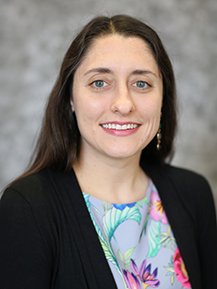Cara Healey
- Associate Professor of Chinese and Asian Studies
- Detchon Center 126
- 765-361-6163
- healeyc@wabash.edu

Cara Healey is Associate Professor of Chinese and Asian Studies in the Modern Languages and Literatures Department. She earned her Ph.D. in East Asian Languages and Cultural Studies with an additional emphasis in Applied Linguistics at the University of California, Santa Barbara.
Dr. Healey’s research situates contemporary Chinese science fiction in relation to both Chinese literary traditions and global science fiction. Her current project approaches global Chinese science fiction from the perspective of generic hybridity, focusing on the ways texts combine, subvert, and reinterpret conventions of various genres.
Dr. Healey also translates Chinese-language fiction.
At Wabash, Dr. Healey teaches Chinese language courses as well as a variety of Asian Studies courses on history, literature, film, and culture. Her courses are often cross-listed with English, Film and Digital Media, Gender Studies, and History. She recently led students on an immersion experience to Los Angeles and San Francisco as part of her course on California’s Asian American Communities.
Education
- 2017
- Ph.D. East Asian Languages and Cultural Studies,
University of California, Santa Barbara - 2013
- M.A. Asian Studies, University of California, Santa Barbara
- 2009
- A.B. East Asian Studies, Princeton University
Recent Course Offerings
- Elementary Chinese I
- Elementary Chinese II
- Intermediate Chinese II
- Intermediate Chinese II
- Modern Chinese Literature
- Chinese Science Fiction
- Global Chinese Cinemas
- Martial Arts Film
- East Asian Popular Culture
- Korean Popular Culture
- California’s Asian American Communities (immersion course)
- Introduction to Asian American Studies
- China 1911 to Present
- Premodern China
- Beijing: Past, Present, and Future
- Introduction to Gender Studies: Focus on East Asia
- Gender and Sexuality in Contemporary East Asia
- Freshman Tutorial: Science Fiction
- Freshmen Colloquium
Recent Publications
Peer-Reviewed Articles
- 2024 (forthcoming)
- “Gender and Genre in Chinese Science Fiction: Reading Hao Jingfang’s Folding Beijing and Xia Jia’s ‘One Hundred Ghosts Parade Tonight.’” Prism: Theory and Modern Chinese Literature, vol 21, no. 3, 2024.
- 2021
- “Reimagining China’s Colonial Encounters: Hybridity in Stephen Fung’s Tai Chi Zero and R.F. Kuang’s The Poppy War Trilogy.” Comparative Literature and World Literature, vol. 6, no. 1, 2021, pp. 35-62.
- 2019
- “Madmen and Iron Houses: Lu Xun, Information Degradation, and Generic Hybridity in Contemporary Chinese Science Fiction.” Science Fiction Studies, vol. 46, no. 3, 2019, pp. 511-524.
- 2017
- “Estranging Realism in Chinese Science Fiction: Hybridity and Environmentalism in Chen Qiufan’s The Waste Tide.” Modern Chinese Literature and Culture, vol. 29, no. 2, 2017, pp. 1-33.
Book Chapters and Invited Articles
- 2024 (forthcoming)
- “Generic Collisions and Environmental Destruction in Wu Ming-yi’s The Man with the Compound Eyes.” Of Butterflies and Bicycles: A Companion to Wu Ming-yi, edited by Michael Berry and Kuei-fen Chiu, Cambria Press, 2024.
- 2023
- “The Success of Chinese Science Fiction.” The Bloomsbury Handbook of Modern Chinese Literature in Translation, edited by Cosima Bruno, Lucas Klein, and Chris Song, Bloomsbury, 2023, pp. 103-115.
- 2017
- “Kuangren’ yu tiewu: Lu Xun dui Zhongguo dangdai kehuan xiaoshuo de yingxiang.” Translated by Lei Tao. Wenxue, Spring/Summer 2017, pp. 84-98.
- Reprinted in Di huo xing tian: Zhongguo kehuan wenxue yanjiu shi nian jingxuan (2024), 2017 Zhongguo kehuan lunwen nianjian (2018), and Sishier shi (2018).
Literary Translations
- 2024
- Shen Dacheng. “The Rambler.” Clarkesworld, Apr. 2024.
- 2022
- Shen Dacheng. “Blackbird.” The Way Spring Arrives and Other Stories, edited by Yu Chen and Regina Kanyu Wang, Tor/Forge, 2022.
- 2018
- Zheng, Egoyan. “The Dream Devourer.” The Reincarnated Giant: An Anthology of Twenty-First-Century Chinese Science Fiction, edited by Mingwei Song and Theodore Huters, Columbia University Press, 2018, pp. 111-129.
- 2017
- Cheng Jingbo. “Western Paradise.” Pathlight, No. 2, 2017.
- 2016
- Liu Ting. “Night/Day.” Pathlight, No. 2, 2016.
- 2015
- Teng Xiaolan. “Year After Year.” Pathlight, Autumn 2015.
- 2015
- Deng Yiguang. “Wolves Walk Atwain.” Pathlight, Spring 2015.
- 2014
- Zhu Wenying. “Double Pupil.” Pathlight, Autumn 2014.
- 2013
- Tie Ning. “Night of the Spring Breeze.” Pathlight, Winter 2013.
Book Reviews
- 2024 (forthcoming)
- Review of Fear of Seeing: A Poetics of Chinese Science Fiction, by Mingwei Song. The China Journal, vol. 93, 2024.
- 2021
- Review of Hundred Days Literature: Chinese Utopian Fiction at the End of Empire 1902-1910, by Lorenzo Andolfatto. PRISM: Theory and Modern Chinese Literature vol. 18, no. 1, 2021, pp. 285-288.
- 2019
- Review of Waste Tide by Chen Qiufan, translated by Ken Liu. Modern Chinese Literature and Culture Resource Center, July 2019.
Public Scholarship
- 2021
- Wu Ming-yi and The Man With the Compound Eyes with Cara Healey on The Translated Chinese Fiction Podcast
- 2017
- Discussion of Han Song’s “Finished” on China Channel (Los Angeles Review of Books)
